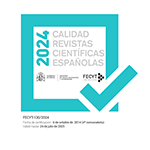From the carolingian technopaegnia to the medieval «clerecía rabínica». new horizons in medieval literature illuminated by comparative poetry
Abstract
The concept of «mester de clerecía» is exposed here as a broad phenomenon whose origins are in Medieval non-quantitative latin poetry, in which, after the lost of the vowels quantity, the number of syllables is determining. This work will analyze two texts from a comparative point of view: a latin poem composed in tetrastichs of pentadecasyllables during the carolingian period, attributed to Paulin of aquilea, which reflects the initial status of medieval narrative poetry «a sílabas contadas»; and a castilian poem composed in the 13th century in «cuaderna vía» written by a Jewish author: the Coplas de Yosef. Both have a common source: the story of Joseph narrated in the book of Genesis. However, the literary procedures used by both authors, as well as the final results are very different. The contrastive analysis of the two texts make us determine the ideology present in each of them and also make us pose key questions related to the concept of «mester de clerecía», its definition, limits and evolution.
Downloads
Article download
License
In order to support the global exchange of knowledge, the journal Cuadernos de Filología Clásica. Estudios latinos is allowing unrestricted access to its content as from its publication in this electronic edition, and as such it is an open-access journal. The originals published in this journal are the property of the Complutense University of Madrid and any reproduction thereof in full or in part must cite the source. All content is distributed under a Creative Commons Attribution 4.0 use and distribution licence (CC BY 4.0). This circumstance must be expressly stated in these terms where necessary. You can view the summary and the complete legal text of the licence.








